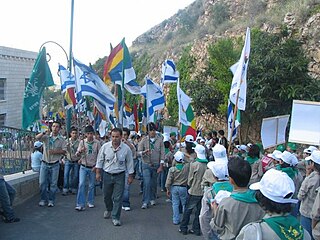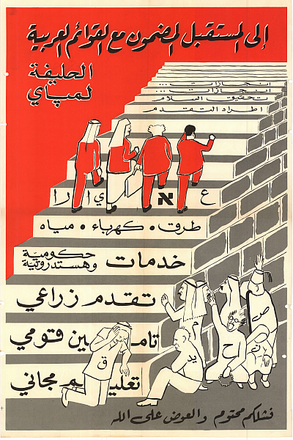Related Research Articles

Zionism is a nationalist movement that emerged in the 19th century to espouse support for the establishment of a homeland for the Jewish people in Palestine, a region roughly corresponding to the Land of Israel in Jewish tradition. Following the establishment of Israel, Zionism became an ideology that supports "the development and protection of the State of Israel".

Neve Shalom, also known as Wāħat as-Salām is a cooperative village in Israel, jointly founded by Israeli Jews and Arabs in an attempt to show that the two peoples can live side by side peacefully, as well as to conduct educational work for peace, equality and understanding between the two peoples. The village is located on one of the two Latrun hilltops overlooking the Ayalon Valley, and lies midway between Tel Aviv and Jerusalem. Falling under the jurisdiction of Mateh Yehuda Regional Council, in 2021 it had a population of 356.

Israelis are the citizens and nationals of the State of Israel. The country's populace is composed primarily of Jews and Arabs, who respectively account for 75 percent and 20 percent of the national figure; followed by other ethnic and religious minorities, who account for 5 percent.

A homeland for the Jewish people is an idea rooted in Jewish history, religion, and culture. The Jewish aspiration to return to Zion, generally associated with divine redemption, has suffused Jewish religious thought since the destruction of the First Temple and the Babylonian exile.

The Law of Return is an Israeli law, passed on 5 July 1950, which gives Jews, people with one or more Jewish grandparent, and their spouses the right to relocate to Israel and acquire Israeli citizenship. Section 1 of the Law of Return declares that "every Jew has the right to come to this country as an oleh [immigrant]". In the Law of Return, the State of Israel gave effect to the Zionist movement's "credo" which called for the establishment of Israel as a Jewish state. In 1970, the right of entry and settlement was extended to people with at least one Jewish grandparent and a person who is married to a Jew, whether or not they are considered Jewish under Orthodox interpretations of Jewish law.

The one-state solution, sometimes also called a bi-national state, is a proposed approach to resolving the Israeli–Palestinian conflict, according to which one state must be established between the River Jordan and the Mediterranean. Proponents of this solution advocate a single state in Israel, the West Bank and the Gaza Strip. The term one-state reality describes the belief that the current situation in Israel/Palestine is de facto one-state.

The Arab citizens of Israel are the largest ethnic minority in the country. They comprise a hybrid community of Israeli citizens with a heritage of Palestinian citizenship, mixed religions, bilingual in Arabic and Hebrew, and with varying social identities. Self-identification as Palestinian citizens of Israel has sharpened in recent years, alongside distinct identities including Galilee and Negev Bedouin, the Druze people, and Arab Christians and Arab Muslims who do not identify as Palestinians. In Arabic, commonly used terms to refer to Israel's Arab population include 48-Arab and 48-Palestinian. Since the Nakba, the Palestinians that have remained within Israel's 1948 borders have been colloquially known as "48-Arabs". In Israel itself, Arab citizens are commonly referred to as Israeli-Arabs or simply as Arabs; international media often uses the term Arab-Israeli to distinguish Arab citizens of Israel from the Palestinian Arabs residing in the Palestinian territories.

Land Day, March 30, is a day of commemoration for Arab citizens of Israel and Palestinians of the events of that date in 1976 in Israel.

Teudat Zehut is the Israeli compulsory identity document issued by the Ministry of Interior, as prescribed in the Identity Card Carrying and Displaying Act of 1982: "Any resident sixteen years of age or older must at all times carry an Identity card, and present it upon demand to a senior police officer, head of Municipal or Regional Authority, or a policeman or member of the Armed forces on duty." According to a precedent from 2011, residents are entitled to refuse presenting the card, unless the state-official has a reason to suspect that they have committed an offence.
Palestinian citizens of Israel, also known as 48-Palestinians are Arab citizens of Israel that self-identify as Palestinian. According to Israel's Central Bureau of Statistics, the Arab population in 2019 was estimated at 1,890,000, representing 20.95% of the country's population. The majority of these identify themselves as Arab or Palestinian by nationality and Israeli by citizenship. Many Arabs have family ties to Palestinians in the West Bank and Gaza Strip as well as to Palestinian refugees in Jordan, Syria and Lebanon.
Palestinian people have a history that is often linked to the history of the Arab Nation. Upon the advent of Islam, Christianity was the major religion of Byzantine Palestine. Soon after the rise of Islam, Palestine was conquered and brought into the rapidly expanding Islamic empire. The Umayyad empire was the first of three successive dynasties to dominate the Arab-Islamic world and rule Palestine, followed by the Abbasids and the Fatimids. Muslim rule was briefly challenged and interrupted in parts of Palestine during the Crusades, but was restored under the Mamluks.
Israeli Jews or Jewish Israelis are Israeli citizens and nationals who are Jewish through either their Jewish ethnicity and/or their adherence to Judaism. The term also includes the descendants of Jewish Israelis who have emigrated and settled outside of the State of Israel, where they are predominantly found in the Western world. The overwhelming majority of Israeli Jews speak Hebrew, a Semitic language, as their native tongue.
In world politics, Jewish state is a characterization of Israel as the nation-state and sovereign homeland of the Jewish people.
The High Follow-Up Committee for Arab citizens of Israel is an extra-parliamentary umbrella organization that represents Arab citizens of Israel at the national level. It is "the top representative body deliberating matters of general concern to the entire Arab community and making binding decisions." While it enjoys de facto recognition from the State of Israel, it lacks official or de jure recognition from the state for its activities in this capacity. The National Committee of the Heads of Arab Localities (NCALC), the sole non-partisan organization representing the Arab minority in Israel, constitutes the main party in the High Follow-Up Committee.

The Palestinian Authority Passport is a passport/travel document issued since April 1995 by the Palestinian Authority to Palestinian residents of the Palestinian territories for the purpose of international travel.

Israeli Druze or Druze Israelis are an ethnoreligious minority among the Arab citizens of Israel.
Basic Law: Israel as the Nation-State of the Jewish People, informally known as the Nation-State Bill or the Nationality Bill, is an Israeli Basic Law which specifies the nature of the State of Israel as the nation-state of the Jewish people. The law was passed by the Knesset—with 62 in favour, 55 against, and two abstentions—on 19 July 2018, and is largely symbolic and declarative in nature. However, it was met with sharp criticism internationally, including from several prominent Jewish American organizations, and has been branded as racist and undemocratic by some critics.
"Jewish and democratic state" is the Israeli legal definition of the nature and character of the State of Israel. The "Jewish" nature was first defined within the Israeli Declaration of Independence in May 1948. The "democratic" character was first officially added in the amendment to Israel's Basic Law: The Knesset, which was passed in 1985.
Post-Zionism refers to the opinions of some Israelis, diaspora Jews and others, particularly in academia, that Zionism fulfilled its ideological mission with the formation of the modern State of Israel in 1948, and that Zionist ideology should therefore be considered at an end. Right-wing Jews also use the term to refer to the left wing of Israeli politics in light of the Oslo Accords of 1993 and 1995.

The Arab satellite lists, Arab lists, or satellite parties were Israeli Arab satellite parties formed for the purposes of electoral support of Mapai, and other Zionist parties between 1948 and the mid-1970s. Between the 1949 elections and the 1969 elections, most of the Israeli Arab vote was divided between the communist parties Maki and Rakah and the Arab satellite lists. According to Israeli scholar Rebecca Kook, Maki and Rakah were considered the only parties to truly represent Arab interests until the Progressive List for Peace won two seats in the 1984 elections.
References
- ↑ Kershner, Isabel (2007-02-08). "Noted Arab Citizens Call on Israel to Shed Jewish Identity". The New York Times. ISSN 0362-4331 . Retrieved 2009-02-14.